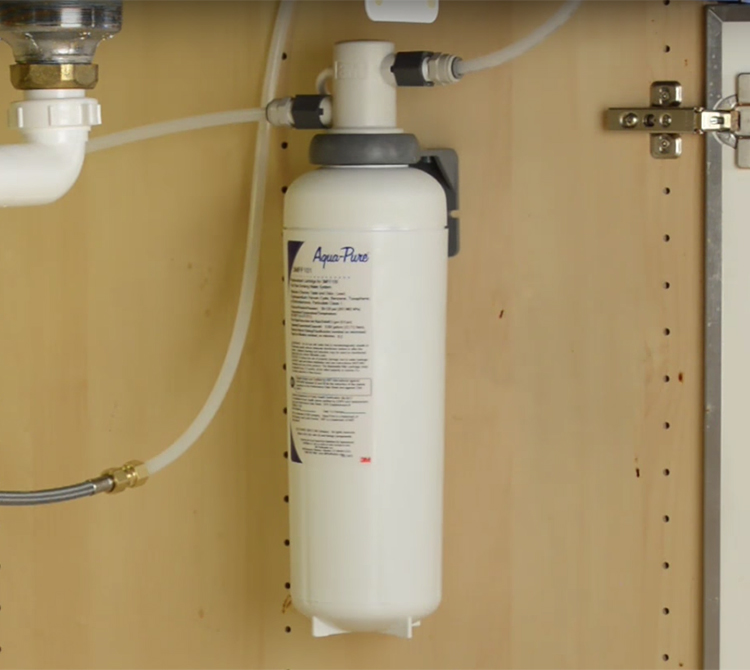Kitchen
How to Choose Your Home Water Filtration System
A good home filtration system does more than provide healthy, fresh tasting water for your home. A water filtration system will deliver clean water for your family and protect your home appliances and fixtures by removing harmful contaminants, bacteria, minerals, sediment and more. Clean water helps keep appliances, fixtures and pipes running better, longer. To determine the type of water filtration your home needs there are a few factors to consider.
Where is Your Water Coming From?
Tap water typically comes from one of two sources: a municipal facility, which federal legislature requires uphold certain EPA standards of water safety before distributing the water, or a private well or pond.
A private water supply from a well, spring, pond, or tank requires private testing which can be obtained with an at-home test kit or by mailing water samples to a test lab. What you find in your water will help determine what type of water filtration system you'll need.
Public water supplies from your town's municipal water supply will have water testing reports readily available so you can find out what bacteria and other potential contaminants are in your water. Keep in mind that although municipal water is typically clean when it is released for distribution, it can absorb contaminants and sediment from pipes or household plumbing fixtures before use or consumption. You may want to test your home's tap water yourself.

Municipal water is typically clean when it is released for distribution, but it can absorb contaminants and sediment from pipes or household plumbing fixtures before use or consumption.
What Type of Filter Best Suits Your Needs?
Point of entry vs. point of use filters
To determine what type of water filtration is best for your home, decide which water sources you want to filter. A whole house filter usually refers to a point of entry filter that filters all water that enters your home. This treats the water that is used in all appliances and fixtures in your home. A point of use filter only filters the water at the point of use such as the kitchen sink or refrigerator ice maker.
What's in Your Water?
Common water contaminants and other factors to consider treating
Chlorine: An excess of chlorine can irritate skin or fade clothing in the wash.
Coliform bacteria: A presence of coliform bacteria does not determine, but can indicate that there is a bacterial contaminant present. A simple chlorination process can render the water safe for consumption.
Hard water: Hard water contains an excess of minerals that can cause scale to buildup in pipes and appliances. If you use a water softener, a reverse osmosis filter can remove the added salt from your drinking water.
Lead: Lead is a toxic metal that can be found in water due to a variety of reasons. One of the most common ways is from lead leaching into the water from the lead solder used to hold together piping or secure fixtures such as faucets and fittings. As of January 2014, federal legislation placed a limit on the weighted average of lead content that can be present in products that are used to dispense or transport drinking water. (Read more about the specific restrictions and what this means for you and your family.) The most effective methods to lower the amount of lead in your water are reverse osmosis and distillation.
Nitrates: Nitrates are a harmful contaminant that is particularly dangerous for pregnant women, infants or anyone with a weakened immune system.

To filter water at the point it enters your home, choose a whole house water filtration system.
Types of Water Filters
There are many different types of water filters that use different technologies to purify water. When shopping for a filtration system be sure to look for water filters that are certified by NSF International.
Carbon filter: A carbon filter, like the one found in pitcher filters or screw-on faucet filters, removes lead and other contaminants from the water by attracting solutes with charged carbon ions.
Reverse osmosis: Reverse osmosis desalinates (removes the salt) water through a process that pressurizes the water forcing it through a semipermeable membrane.
Distillation: The process of distillation heats water into steam killing harmful bacteria. Condensation from the steam collects and is separated leaving behind the contaminants.
Whole house filter: A whole house filter, also known as a point of entry (POE) filter, removes most of the dirt, sediment and chlorine from the water that will circulate through your home. If you have hard water, consider installing a water softener to remove the hard minerals that can cause scale buildup.
Point of use (POU) filter: Point of use filters include under sink, faucet mount, countertop, pitchers and water bottle filters that filter water right before use. POU filters are a great solution to improve the taste, odor or the safety of drinking water.
Ultraviolet (UV) filtration: Ultraviolet filtration uses natural UV radiation to inhibit harmful bacteria's ability to reproduce.
Ceramic filters: Ceramic filters remove bacteria and other contaminants by filtering water through small pores in the ceramic cartridge.
Pitchers and under sink filters: Under sink filters require installation but are more convenient and generally more effective than alternatives. Countertop filters, like pitchers and bottles, do not require installation which makes them great options for renters but they typically operate slower and require more frequent filter replacements.

POU (Point Of Use) filters, like this under sink system, are a great solution to improve the taste, odor and safety of drinking water.
Maintenance
Like any appliance in your home, regular maintenance is required for the water filtration system you choose. Be sure to check your water filtration system at least once per year to check that your filters are working properly. Follow the guidelines for your particular system and replace filter cartridges, reverse osmosis membranes and other parts as recommended by the manufacturer.





